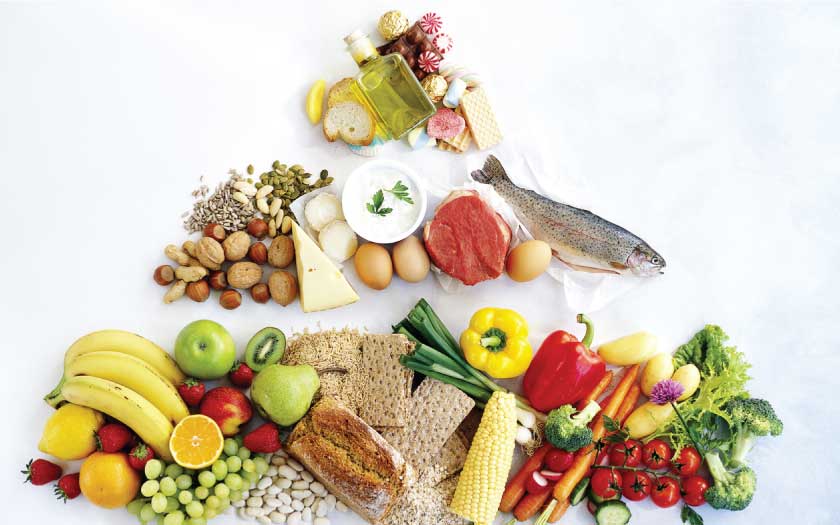Protein, fat, and carbohydrate — the crucial three nutrients known also as Macronutrients. Every human being needs them and they’re especially crucial during the delicate developing years of babies and toddlers.
Macronutrients are responsible for supplying energy for every imaginable function of the human body. Needless to say, they are crucial for a young child’s growth and development. These macronutrients, along with many other vitamins and minerals are what parents have to pay due attention to when planning a healthy diet for their little ones.
The power of protein
Think of the body’s tissue and muscle building power, think of protein. It’s needed for repairing damaged tissues as well. Found in foods like meat, beans, eggs, soy, and dairy products, protein has four calories per gram. Young children experience rapid growth, which is why protein is an important component of their diet. Infants meet their protein needs through breast milk or infant formula. As toddlers venture into a larger range of foods, including meat, beans, cheese, milk or milk alternative, egg, and nut butter, their protein needs are easier to meet.
Important to remember: When it comes to protein, more does not necessarily mean better! Too much protein in a child’s diet can damage the kidneys and even cause dehydration.
Why fat is a friend
Fat is a component that makes up a large part of a healthy infant’s diet — up to 50 percent of the little one’s calorie needs! This requirement declines slowly to about 30 to 40 percent as they become toddlers and preschoolers.
It’s easy to meet fat recommendations in the first year, as breast milk and infant formula incorporate the right amount of fat. As a vital part of the diet, fat is involved in brain growth and is a concentrated energy source (nine calories per gram). Babies and toddlers don’t even have to consume that much food to meet this requirement.
Good sources of fat for babies and toddlers are avocado, whole milk (up to age two), cheeses, full-fat yogurt, and nut butter (after two years old).
Important information for vegetarian and vegan parents
Babies and toddlers whose diet is highly concentrated in grains, fruits, and vegetables but low in fat may experience a slowdown in growth and development.
Complex carbohydrate
Carbohydrate is the main energy source for working muscles, the brain, and nervous system and is found in nearly all foods. It’s divided into two categories, namely complex carbohydrates, and simple carbohydrates, also known and good and bad carbs respectively. Foods containing complex carbohydrates include wholesome foods that are closest to nature, such as fruit, vegetables, dairy products, and whole grains. Forms of simple carbohydrates include refined sugar, syrups, sugary foods such as cakes and cookies, sweets, etc. Carbohydrate weighs in at four calories per gram, similar to protein. A diet lacking in complex carbohydrates could interfere with childhood growth and development.
How does your child’s diet fare?
When you’re pregnant, you’re in charge of what you consume, so it’s easier to ensure that your unborn baby is getting all the important nutrients he or she needs to grow into a healthy bundle of joy. When your little one is born and begins to grow and develop, it’s just as important to maintain their good health, although it is now a much more challenging task. This is especially so when babies begin to take solid food and develop a picky eating attitude.
Note: If you are considering putting your young child on a specialised diet which limits any of the important macronutrients, do get the expert opinion of your doctor or dietitian first, to avoid any serious ramifications to your child’s health.
Are supplements necessary?
We live in a world where convenience and speed rule. The cheaper and faster the food is, we’re inclined to go for it. Even the way we feed our young has also been affected. The regard and awareness we should be having of what’s healthy and what’s not when it comes to feeding our children seem to be lost with the times with the easy accessibility of fast foods in the form of kids’ meals, highly processed foods and other unhealthy choices which are more convenient and time-saving compared to cooking at home.
This problem is further compounded by the fact that many young children are selective eaters who will then suffer from further lack of nutrition due to their limited diet.
While a diet rich in all the macronutrients is what young children need to grow well and develop normally, it does not seem to be fully possible in most modern households. This is the main reason why parents tend to rely on supplements, to some extent to help close up nutritional gaps in their little ones’ diet.
Besides purchasing supplements that are certified by the Ministry of Health, parents should also practise moderation and only feed supplements according to their child’s dietary needs. When in doubt, it is always best to follow the instructions on the supplement label or discuss the issue further with your pediatrician or nutritionist.

A Balanced Meal
As a rough guide, children (and adults alike) should enjoy a daily diet of:
- 5 servings of starchy foods (e.g. bread, potatoes, pasta, cereal, rice)
- 5 servings of fruits or vegetables
- 2 servings of protein foods (e.g. meat, milk, cheese)
- A minimal serving of salt, sugar, oil
Who Needs Multivitamins?
Most children can get by without a multivitamin, but your child might require this supplement if he or she:
- Is not thriving mentally/physically
- Has chronic diseases or food allergies
- Has a restrictive diet (e.g. vegan diet)
Multivitamin supplements for babies and little children are typically found in palatable syrup forms. These specially made supplements are packed with all the essential vitamins and minerals that a growing child needs daily. Since it’s highly likely that your child will already be getting his or her B vitamins, vitamin D, calcium and iron from other common daily foods (like milk, cereal, and orange juice), it is important that you choose a multivitamin that doesn’t provide more than 100% of the Daily Value of vitamins and minerals your child requires.
A Healthier Stomach with Probiotics
Probiotics are living organisms contained in a tablet or powder form. Specifically, probiotics consist of good bacteria and yeast which can improve the number of micro-flora in your child’s body. Children with a good digestive system due to early consumption of probiotics will enjoy better results, as compared to taking probiotics later on during adulthood.
Unfortunately too, natural probiotics are abundant mostly in foods that are less popular with little ones, such as fermented soy or dairy, wheat, onions, artichokes, and asparagus. (Yes, some of us adults are not too crazy about them either!)
Probiotic supplements in powder form are ideal because it is easy to serve in juices or mixed into your little one’s cereal. Children and babies who suffer from diarrhoea or vomiting due to a stomach virus may benefit greatly from probiotics.
Vitamin D for Stronger Bones
Parents used to believe that their little ones could get all the Vitamin D they need just by drinking milk or playing in the sun, but recent studies have found that children these days are simply not getting enough of this essential vitamin. Long term lack of Vitamin D can eventually cause rickets, a bone-softening disease due to the body’s inability to absorb calcium and phosphorous that is needed to strengthen the bones. Infants who are exclusively breastfed are especially encouraged to receive daily Vitamin D supplements.
Babies and children need about 400 International Units (IU) per day of Vitamin D.
Vitamin C
Every household should be stocked with Vitamin C supplements, as this vitamin (also known as ascorbic acid) is an important antioxidant that helps the body heal itself and strengthens the body’s immune system. Bolster your child’s immunity against sickness or disease with a daily dosage of Vitamin C. You might also want to consider purchasing the chewable version of this vitamin for little ones with teeth. Check the recommended age group on the label before purchasing, or ask your doctor for a recommendation.
Cod Liver Oil
Fish oils are good for children as they protect against heart disease and lower the risk of developing arthritis later on in life. Cod liver oil is especially beneficial as it contains fatty acids known as Omega-3s that the body cannot self-produce. A child deficient in these good fatty acids will display symptoms such as dry skin, dandruff, flaking nails, and low energy levels. Cod liver oil is not the best tasting supplement on its own, and manufacturers have long caught on to that fact. That’s why these days, there are many good brands of more palatable cod liver oil supplements with delicious, fruity flavours.
Chewable or syrup form?
Little kids who already have their first set of teeth should have no problems with chewable supplements, especially if they come in tasty flavours. However, do ensure that your child consumes his or her chewable supplement as soon as it’s offered. Remember, the last thing you want is to find expensive supplements hidden behind couches, in coin purses, or even have it fed to an eager family pet when you’re not looking!
Babies and little ones who cannot chew yet will benefit from the syrup forms of supplements available in the market. Always check on the recommended dosage before feeding them to your child.


